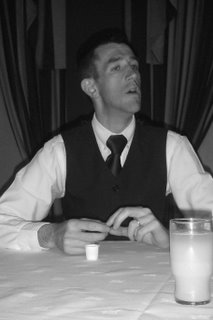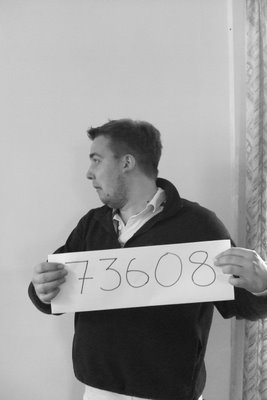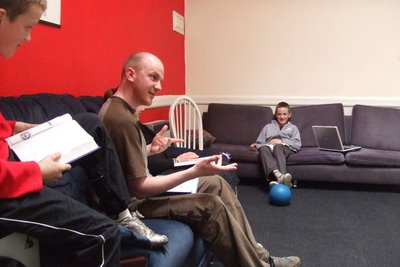Ok dear readers, now is the moment to go and make a cup of tea or other beverage of your choice. This is going to be hefty (i reckon about 15 minutes), but worth it I hope. I was struck hugely by another of CS Lewis's essays, and it seems to have really struck a chord with people i've mentioned it to, so here it is in it's fullness: (hope I'm not breaking copyright by doing this)
We say a great many things in church (and out of church too) without thinking of what we are saying. For instance, we say in the Creed 'I believe in the forgiveness of sins.' I had been saying it for several years before I asked myself why it was in the Creed. At first sight it seems hardly worth putting in. 'If one is a Christian,' I thought, 'of course one believes in the forgiveness of sins. It goes without saying.' But the people who compiled the creed apparently thought this was a part of our belief which we needed to be reminded of every time we went to church. And I have begun to see that, as far as I am concerned, they were right. To believe in the forgiveness of sins is not nearly so easy as I thought. Real belief in it is the sort of thing that very easily slips away if we don't keep on polishing it up.
We believe that God forgives our sins, but also that he will not do so unless we forgive other people their sins against us. There is no doubt about the second part of this statement. It is in the Lord's Prayer; it was emphatically stated by our Lord. If you don't forgive you will not be forgiven. No part of his teaching is clearer: and there are no exceptions to it. He doesn't say that we are to forgive other people's sins provided they are not too frightful, or provided there are extenuating circumstances, or anything of that sort. We are to forgive them all, however spiteful, however mean, however often they are repeated. If we don't we shall be forgiven none of our own.Now it seems to me that we often make a mistake both about God's forgiveness of our sins and about the forgiveness we are told to offer to other people's sins. Take it first about God's forgiveness.
I find that when I am asking God to forgive me I am often in reality (unless I watch myself very carefully) asking him to do something quite different. I am asking him not to forgive me but to excuse me. But there is all the difference in the world between forgiving and excusing. Forgiveness says 'Yes, you have done this thing, but I accept your apology, I will never hold it against you and everything between us two will be exactly as it was before.' But excusing says 'I see that you couldn't help it or didn't mean it, you weren't really to blame.' If one was really not to blame then there is nothing to forgive. In that sense forgiveness and excusing are almost opposites. Of course in dozens of cases, either between God and man, or between one man and another, there may be a mixture of the two. Part of what seemed at first to be the sins turns out to be really nobody's fault and is excused; the bit that is left over is forgiven. If you had a perfect excuse you would not need forgiveness: if the whole of your action needs forgiveness then there was no excuse for it. But the trouble is that what we call 'asking God's forgiveness' very often really consists in asking God to accept our excuses. What leads us into this mistake is that there usually is some amount of excuse, some 'extenuating circumstances'. We are so very anxious to point these out to God (and to ourselves) that we are apt to forget the really important thing; that is, the bit left over, the bit with the excuses don't cover, the bit which is inexcusable but not, thank God, unforgivable. And if we forget this we shall go away imagining that we have repented and been forgiven when all that has really happened is that we have satisfied ourselves with our own excuses. They may be very bad excuses: we are all too easily satisfied with ourselves.
There are two remedies for this danger. One is to remember that God knows all the real excuses very much better than we do. If there are real 'extenuating circumstances' there is no fear he will overlook them. Often he must know excuses that we have never thought of, and therefore humble souls will, after death, have the delightful surprise of discovering that on certain occasions they sinned much less than they had thought. All the real excusing he will do. What we have got to take to him is the inexcusable bit, the sin. We are only wasting time by talking about all the parts which can (we think) be excuses. When you go to a doctor, you show him the bit of you that is wrong - say, a broken arm. It would be a mere waste of time to keep on explaining that your legs and eyes and throat are all right. You may be mistaken in thinking so; and anyway, if they are really alright, the doctor will know that.
The second remedy is really and truly to believe in the forgiveness of sins. A great deal of our anxiety to make excuses comes from not really believing in it; from thinking that God will not take us to himself again unless he is satisfied that some sort of case can be made out in our favour. But that would not be forgiveness at all.
Real forgiveness means looking steadily at the sin, the sin that is left over without any excuse, after all allowances have been made, and seeing it in all its horror, dirt, meanness and malice, and nevertheless being wholly reconciled to the man who has done it. That, and only that, is forgiveness, and that we can always have from God if we ask for it.When it comes to the question of forgiving other people, it is partly the same and partly different. It is the same because, here also, forgiving does not mean excusing. Many people seem to think it does. They think that if you ask them to forgive someone who has cheated or bullied them you are trying to make out there was really no cheating or no bullying.
But if that were so, there would be nothing to forgive. They keep on replying 'But I tell you the man broke a most solemn promise.' Exactly: that is precisely what you must forgive. (That doesn't mean you must necessarily believe his next promise. It does mean that you must make every effort to kill every trace of resentment in your own heart - every wish to humiliate or hurt him or to pay him out.) The difference between this situation and the one in which you are asking God's forgiveness is this. In our own case we accept excuses too readily, in other people's we do not accept them easily enough. As regards my own sins it is a safe bet (though not a certainty) that the excuses are not really so good as I think: as regards other men's sins against me it is a safe bet (though not a certainty) that the excuses are better than I think. One must therefore begin by attending carefully to everything which may show that the other man was not so much to blame as we thought. But even if he is absolutely fully to blame we still have to forgive him; and even if ninety-nine per cent of his apparent guilt can be explained away by really good excuses, the problem of forgiveness begins with the one per cent of guilt which is left over.
To excuse what can really produce good excuses is not Christian charity; it is only fairness. To be a Christian means to forgive the inexcusable, because God has forgiven the inexcusable in you.This is hard. It is perhaps not so hard to forgive a single great injury. But to forgive the incessant provocations of daily life - to keep on forgiving the bossy mother-in-law, the bullying husband, the nagging wife, the selfish daughter, the deceitful son - how can we do it? Only, I think, by remembering where we stand, by meaning our words when we say in our prayers each night 'Forgive us our trespasses as we forgive those who trespass against us.' We are offered forgiveness on no other terms. To refuse it is to refuse God's mercy for ourselves. There is no hint of exception and God means what he says.
Congratulations on surviving to the end, I hope that it all made sense and I didn't miss out too many key words in writing it out. Let me know what you think...













